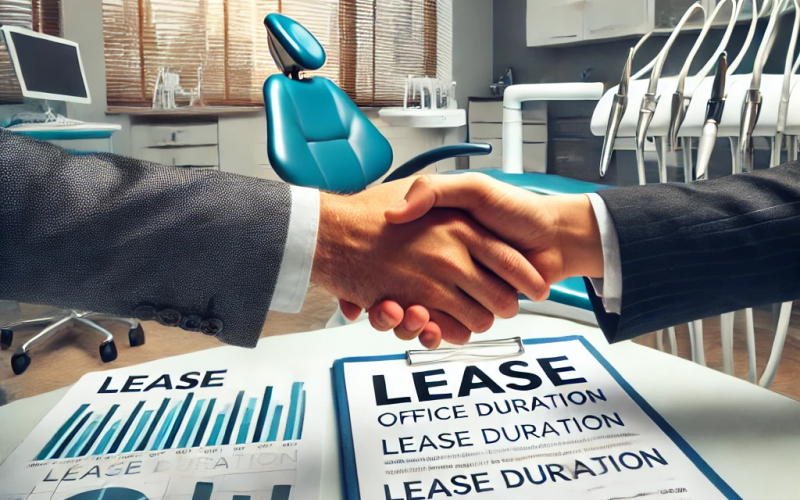The Crucial Role of Office Lease Negotiations in Dental Practice Sales
Published on
- 10-24-2024
Read Time
- 1 minutes read
The Crucial Role of Office Lease Negotiations in Dental Practice Sales

When dental professionals consider transitioning their practice, many aim to maximize value and ensure a seamless transition for their patients and staff. However, we often see clients overlook the crucial role that lease terms may play in determining value and facilitating a smooth transition. For instance, a long-term lease with favorable rent and renewal options can make the practice more appealing to some buyers. Conversely, a short-term lease or one with unfavorable terms can dissuade buyers and diminish the practice’s value.
Before we explore the ways in which an office lease can influence the sale of a dental practice, let’s establish a foundational understanding of lease agreements. A lease constitutes a legally binding contract between a landlord and a tenant, delineating the terms and conditions governing the tenant’s use of the property. These terms typically encompass lease duration or term, monthly rent, additional fees, and the responsibilities assigned to both parties.
As you review your office lease and consider your practice transition, please consider the following:
Timing of Lease Negotiations: Negotiating an office lease is an essential step in maximizing the value of your practice whenit comes time to sell. However, it’s not wise to wait until the sale is imminent to start these discussions. In fact, when you are ready to sell, it may already be too late. You must engage your landlord when you are renewing or signing a new lease, because you can use the threat of leaving to negotiate more favorable terms.
“Negotiating an office lease is an essential step in maximizing the value of your practice when it comes time to sell. However, it’s not wise to wait until the sale is imminent to start these discussions.”
Lease Duration and Renewal Options for Dental Practices:
Dental practices benefit from a longer lease term, which offers stability and security. We recommend a 5-year lease term with the flexibility of multiple 5-year renewal options. This arrangement provides dentists with the assurance of long- term office occupancy while allowing the freedom to relocate if a better opportunity arises. It’s important to note that most dental lenders will require at least a 5-year lease or options when financing the sale of the practice.
Base Rent: The monthly rent is a significant expense for any dental practice. It is essential to negotiate a fair rent that is in line with market rates and reflects the value of the property.
A dental specific real estate agent can be a great resource for ensuring that you are paying fair market value rent.
Additional Rent and Fees: Understanding the type of lease you have—whether it’s a gross lease or a triple net lease—is crucial. Let’s break it down:
- Gross Lease: In a gross lease, no extra fees are added to the base rent. It’s a straightforward arrangement where the tenant pays a fixed amount, and the landlord covers all other costs, including maintenance, taxes, and insurance.
- Triple Net (NNN) Lease: With a triple net lease, the tenant’s share of building expenses—maintenance, property taxes, and insurance—is added to the base rent as additional rent. These leases are common for longer- term agreements (typically 5 to 10 years). Landlords prefer NNN leases because they allow better control over rising Expenses.
While a gross lease may seem attractive, most landlords will require a triple net lease or charge a premium rent for a gross lease. This is why most dental practice leases are triple net. If you’re in a triple net lease, it’s essential to know what’s included in the additional rent and what’s excluded. Some common items excluded from additional rent are HVAC replacements, administrative expenses incurred by the landlord, and capital improvements. Additionally, consider negotiating a cap on additional rent to protect against unexpected cost increases, but understand that most landlords will be reluctant to agree to expense caps.
Tenant and Landlord Responsibilities: The lease should clearly outline the responsibilities of both the tenant and the landlord. Who is responsible for maintaining the premises? Who is responsible for maintaining the HVAC? What happens when the roof leaks? What if the landlord fails to fix the leak? Exclusivity: Exclusivity in the office lease can be a major benefit for a dental tenant. This means that the landlord agrees not to rent any other space within the building to a competing dental practice. This arrangement ensures that the dental practice has a protected market and does not face direct competition within the same building. It also guarantees a more stable patient base and revenue stream for the dental practice. Exclusivity clauses are often negotiated as part of the lease agreement and can provide a significant advantage to the dental practice in terms of market positioning and growth potential.
“Exclusivity clauses are often negotiated as part of the lease agreement and can provide a significant advantage to the dental practice in terms of market positioning and growth potential.”
Assignability: Having an office lease with attractive rent and terms is an asset to your practice transition, but if the buyer cannot assume the lease or if the landlord can charge exorbitant fees to the tenant upon an assignment, then the asset value is greatly diminished. We recommend a simple assignment provision that the landlord has the right to consent to an assignment, but that this consent cannot be unreasonably withheld, conditioned, or delayed.
The Takeaway
Negotiating a favorable office lease certainly assists in ensuring the success of a dental practice sale. The terms of the lease can significantly impact the value of the practice and its attractiveness to potential buyers. Plan ahead, seek out a reputable dental practice broker to assist in negotiating favorable terms. Maximize the practice value and ensure a smooth transition to the new owner. Visit www.hemmenassoc.com and request a free consultation, email [email protected] with a request, or call 800-745-1438.
